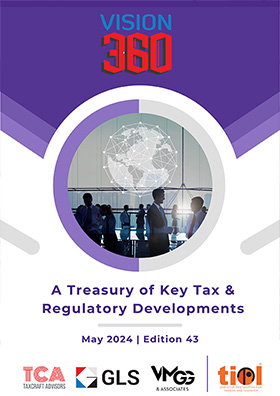TIOL-DDT 1321
18.03.2010
Thursday
RECENTLY we received a mail from a multinational engineering consultant/EPC contractor on the extent of service tax liability on EPC contracts, the excerpts of which is as follows:
“In the contracts with our clients, generally there is a provision of 5% or 10% of total contract value as retention payable at the end of the project. Invoices (RB bills) are raised for the net amount (after deducting the proportionate retention) and service tax is levied on the net amount after deducting retention. Whether levying of service tax on the net amount (after deduction retention) is correct?”
This is an oft repeated question faced by service providers executing EPC contracts/turnkey projects. For the contractors executing mega turnkey projects / EPC contracts, the payments from the clients are linked to the phase wise completion of the projects and the payment terms and conditions usually speaks of a certain percentage of the value of contract being retained by the clients; which only becomes disbursable to the contractor after completion of the project subject to fulfilling such other relevant terms and conditions of the contract. The quantum of percentage of retention money usually serves as a disincentive to delay the execution of the projects and often serves as a penalty for not executing the projects on time.
The issue is whether service tax is payable on the entire value of the contract or the net value of the contract arrived after deducting the amount indicated as retention money in the contracts.
Section 67 of Finance Act, 1994 speaks of service tax being chargeable on the value of taxable service which is the gross amount charged by the service provider. However, Rule 6 of the Service Tax Rules, 1994 provides that the service provider shall be liable to pay service tax only on the amounts received from the clients.
Since retention money is not received till the end of the project, in terms of the existing provisions of Rule 6 of the Service Tax Rules, 1994, service tax may not be paid on such retention money till the same is released by the client and received by the contractor. Even at the end of the project, service tax is payable only on the amount actually received from the client, because in some cases some portion of the retention money may still be retained by the clients as a penalty for reasons like delay in execution of the project, quality etc.
Distinction in Excise and Service tax payment mechanism
THIS issue also brings out different methodologies adopted in the realm of excise and service tax. Manufacturers who are registered with excise authorities do not have the facility to pay excise duty on the basis of payments received from their buyers. Instead they are liable to pay duty on the invoice value.
The only concession provided to them is deferring the payment of duty to the 5th of the following month by virtue of Rule 8 of Central Excise Rules, 2002. The manufacturers cannot write off the amounts not received from their buyers and they end up paying excise duty on the entire invoice value.
Further, if assessees in central excise receive lesser amounts from their buyers than what is mentioned in the invoice and if they have paid excess duty, then to claim refund of that excess duty, they are subjected to the rigours of Section 11B of Central Excise Act, 1994. On the contrary, service tax assessees are fortunate in that respect, because they are liable to pay tax only on the amount received from their clients. If they still end up paying higher tax, they have the option of adjusting the higher payments in terms of Rule 6(4) to Rule 6(4C) of Service Tax Rules, 1994 subject to the conditions prescribed therein.
Ludicrous declaration for domestic passengers travelling in international flights
RECENTLY I flew to Hyderabad from Bangalore by Air India's Bangalore-Muscat flight. Along with my Boarding Pass, I was given a declaration form which I was asked to sign and hand over to the Customs Officer. The form required me to give a declaration that I do not possess the following articles or that I have valid customs clearance adjustments. The form was to be signed before a Customs Officer and to be countersigned by the Customs escorting officer. [This escort business is a strange concept in itself. More on that a little later.]
1. Watches, watch movements or parts thereof – of foreign origin
2. Transistors and diodes
3. Photographic cameras including Video Cameras
4. TV sets
5. VCRs, VCPs and Video Tapes [ who has them these days?]
(All the goods listed at S.Nos . 1 to 5 above are also available in a single instrument called a cell phone – a majority of the cell phone models available in the market these days have all these features in-built into a single instrument. Nowadays every person has a fancy of buying a cell phone with all these features and they also travel by air and more likely end up in international flights for reaching domestic destinations. So, how about declaring a cell phone and more so a cell phone with all the above technological features. What is the point?)
6. Zip fasteners
[Every male (or) female wearing a trouser will invariably have a zip fastener – so what is the Customs gaining out of this piece of declaration. Hope they don't ask for a physical examination]
7. Any other electronic items
8. Gold bullion and gold jewellery
(Gold jewellery is fashionable. These days men are wearing more jewellery than women. And can't I carry a laptop or a flash drive?)
9. Silver bullion and coins
10. Foreign currency
11. Indian currency beyond Rs. 5000/-
(Are we living in medieval times? With inflation touching double digits, a sugar bag weighing a quintal is costing Rs. 5000/-. So, what are we trying to prove if we catch a person travelling with more than Rs. 5000/- that too to a domestic destination? Nowadays, banks are issuing international debit cards with far higher ceiling for cash withdrawal. What is the sanctity for this Rs. 5000/-?)
12. Any other dutiable/imported item
(All the goods tucked into a suitcase/ briefcase, worn by the passenger are dutiable goods. Will there be any dispute on that?)
With such outdated declaration forms, what is the Customs or for that matter Air India trying to prove? Why should we waste time and paper in such ridiculous activities?
Jewel encrusted beetle declared to US CBP
A woman crossing from Mexico at Brownsville, Texas, declared a live bug decorated with blue and gold and worn as a brooch on her sweater but she did not have the right paperwork. The beetle was attached to the woman's clothing by a gold chain and a safety pin. It was an unlikely fashion accessory but the arrival of a jewel-encrusted beetle at a US border post certainly bugged customs officers. Strictly following pest control measures, the officers of CBP promptly confiscated the bug and sent it for further inspection.
Jurisprudentiol – Friday's cases
 Customs
Customs
Rover sports Car stolen in UK and imported into India as brand new - Owner of vehicle making application as Intervener for re-export of Car – Re-export allowed but redemption fine not imposed by adjudicating authority - Non-imposition of RF is not proper - One lakh rupees ordered to be deposited as RF: CESTAT
ONE Abdul Hassan Mohammed Khan , filed bill of entry for clearance of a vehicle declared as “Brand new Rover Sports Car – RHD Model No. 4.2 ( V8 ) ” . On enquiries, it was revealed that the vehicle was a used car. It was further found that the importer did not satisfy the condition mentioned in the import licensing note appended to Chapter 87 of the ITC (HC) classification. Lombard North Central PLC , the intervener submitted documents before the adjudicating authority to prove that they had filed a complaint to the UK Police that their vehicle was stolen and exported to India . It was also requested that the car be permitted to be cleared for re-export after adjudication.
Central Excise
Refund - Duty paid twice – in view of self-assessment and Central Excise officers having not served an order, challenging of order does not arise at all – Proposition that “assessment” includes “self assessment” is not correct for purpose of appeal under section 35 of the Central Excise Act, 1944 – CESTAT
THIS appeal is filed by the appellant against the order of the Commissioner(Appeals), wherein he rejected the refund claim holding that the refund claim contrary to the assessment order is not maintainable without the order of assessment having been modified in appeal.
Income Tax
Non-resident hired to work in India - employer promises to pay additional tax burden in excess of one payable in home country - tax liability in India turns out to be lesser - difference retained by employer as 'hypo tax' - AO for taxing it - hypo tax is not income in hands of non-resident taxpayer - not taxable: Delhi HC
IS 'hypo tax' an income? Is it taxable in the hand of non-residents working in India? With more and more non-residents coming to India either on deputation or to seek employment, foreign employers have been devising innovative employment conditions to attract good talents agreeing to work on India. One of the carrots which is often promised to non-resident individuals is that in case of any extra tax liability in excess of the ones being paid by them in their own countries, the employers will take care of that. But, as the luck would have it, the tax rate is lower than many countries in the world, and the non-residents have to pay lesser tax. The difference between the tax paid in India and the tax they would have paid in their own countries, is known as 'hypothetical tax'.
See our columns Tomorrow for the judgements
Until Tomorrow with more DDT
Have a nice day.
Mail your comments to vijaywrite@taxindiaonline.com









 Download PDF
Download PDF Customs
Customs



